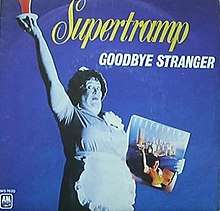Goodbye Stranger
| "Goodbye Stranger" | ||||
|---|---|---|---|---|
 | ||||
| Single by Supertramp | ||||
| from the album Breakfast in America | ||||
| B-side | "Even in the Quietest Moments" | |||
| Released | June 1979 | |||
| Recorded | ||||
| Genre | ||||
| Length | 5:50 | |||
| Label | A&M | |||
| Songwriter(s) | ||||
| Producer(s) |
| |||
| Supertramp singles chronology | ||||
| ||||
"Goodbye Stranger" is a song by the English rock band Supertramp, which first appeared on their sixth studio album, Breakfast in America (1979). Despite being met with only limited success in the UK, it was a major hit elsewhere, even a Top 20 hit in USA and Canada, reaching number 15 and 6 respectively.
Context and meaning
The song features two voices, representing two protagonists, sung by Rick Davies in the verses and also by Rick Davies in the choruses. It tells a story of the two protagonists leaving each other, and the end of their relationship.
During the writing of Breakfast in America, the group's main writers, Davies and Hodgson, had trouble communicating and had several disagreements:[1]
That didn't mean Breakfast in America was all laughs, however; it was nearly titled Hello Stranger, due to a preponderance of songs about relationships broken by a lack of communication -- a subject Davies and Hodgson knew well, given how poorly they were getting along during the making of the album. Although their songwriting partnership had long been the basis of the band's music, by the time Breakfast got started, they hadn't actually written together in years; as they admitted during a 1977 NME interview, Supertramp existed in a state of delicate detente.
— UltimateClassicRock.com[1]
This influenced several songs:[1]
A few of the songs really lent themselves to two people talking to each other and at each other. I could be putting down Rick's way of thinking and he could be challenging my way of seeing life. We were thinking of making that the theme ... We weren't communicating very well through this album.
— Roger Hodgson, Interview in UltimateClassicRock[1]
This resonates with some of the songs' lyrics, such as these from "Goodbye Stranger":
Now I believe in what you say
Is the undisputed truth
But I have to have things my own way
[...]
Goodbye stranger it's been nice
Hope you find your paradise
Tried to see your point of view
Hope your dreams will all come true
Some other parts of the lyrics might be references to very specific experiences the two shared, such as the "Goodbye Mary, Goodbye Jane", a common reference to marijuana, possibly being a reference to the event in 1972 when Davies refused to experience LSD with Hodgson, which the latter considers for himself to have been a mind-opening and life-changing experience, and which was one of the earliest points of disagreement between the two artists.[1]
Music video
In the music video, the band plays the track on a soundstage. Rick Davies is playing a Wurlitzer electric piano, Roger Hodgson and Dougie Thomson are playing their guitars (Hodgson on electric, Thomson on bass), John Helliwell is playing keyboards and Bob Siebenberg is playing drums and percussion.
Cover versions
- The song was covered by Lili Haydn on her Goodbye Stranger EP (2007, Nettwerk Music Group)
In popular culture
- It featured in the TV show WKRP in Cincinnati during the episode "Baby, If You Ever Wondered".
- It was included on the 1999 soundtrack to Magnolia album, along with "The Logical Song", Supertramp's previous single on the Billboard singles charts.
- The American TV series Supernatural has an episode named after the song, which features it prominently during the closing scene.
- A parody of the song, called "Goodbye, Toby", was featured in the 4th season finale of The Office, sung by Michael Scott (Steve Carell) sarcastically to send off Toby Flenderson (Paul Lieberstein).[2]
- The song was featured in the Tonya Harding biographical film I, Tonya in the scene where Tonya Harding finally leaves her husband, Jeff Gilooly.
Charts
| Chart (1979) | Peak position |
|---|---|
| Canadian RPM Singles Chart[3] | 6 |
| New Zealand Singles Chart[4] | 40 |
| UK Singles Chart[5] | 57 |
| U.S. Billboard Hot 100[6] | 15 |
| U.S. Billboard Adult Contemporary[7] | 32 |
Personnel
- Rick Davies — Wurlitzer electric piano, Hammond organ, lead and backing vocals
- Roger Hodgson — electric guitar, backing vocals
- John Helliwell — backing vocals, whistling
- Bob Siebenberg — drums
- Dougie Thomson — bass guitar
References
- 1 2 3 4 5 Jeff Giles (2016-03-29), "THE HISTORY OF SUPERTRAMP'S BIGGEST-SELLING ALBUM, 'BREAKFAST IN AMERICA'", UltimateClassicRock.com, archived from the original on 2017-08-01, retrieved 2017-11-05
- ↑ The Office - Goodbye Toby, from NBC, archived from the original on 4 October 2011, retrieved 27 August 2009
- ↑ "Top Singles - Volume 32, No. 1, September 29, 1979". RPM. Retrieved 2012-02-19.
- ↑ Charts.org.nz
- ↑ Supertramp in the UK Charts Archived 17 February 2011 at the Wayback Machine., The Official Charts.
- ↑ "Goodbye Stranger - Supertramp". Billboard. Retrieved 2012-02-19.
- ↑ Whitburn, Joel (1993). Top Adult Contemporary: 1961–1993. Record Research. p. 234.